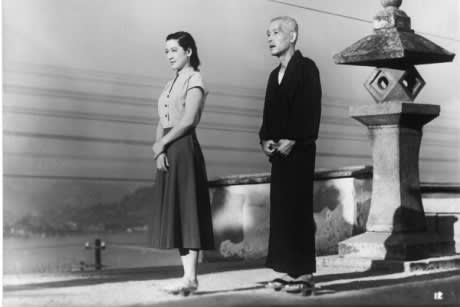While devastating social commentaries that transcend the surface narrative by utilizing tone and pacing to heighten feelings and examine greater society on the whole are, in a minor sense, commonplace in the lexicon of global cinema, it's important to understand and appreciate where this structure was born.
Yasujirô Ozu, whose works often touched on generational discourse and the effects of war on modern (at the time) Japan, was conscripted into the army during his filmmaking career, which, along with knowledge of, and appreciation for world cinema, influenced his vision and his work in the late '40s and early '50s. Tokyo Story, considered by many to be his masterpiece, is a film of intense deliberateness. Often using a collapsed perspective and a stationary angle just below the actor's eye, he observes his story patiently, allowing impatience to compound on the viewer, making sudden events hit that mark that much harder.
The story, which follows aging parents (Chishû Ryû and Chieko Higashiyama) from their rural home to Tokyo where their successful adult children live, is deceptively simple. Once in Tokyo, the couple slowly reveal a slightly subversive, but never fully verbalized, perspective on their children as slightly less than they had hoped for. Commenting on their son's suburban home and lower rung status as a doctor, they adhere to politeness and customs while their children toss them around from home to home, far too busy in a postwar economy to spend money, or time, on trivialities like family.
Their lack of worth and the lack of respect paid to them—while never outwardly rude; more inconvenienced—is an implicit nod to a changing cultural landscape, just as the outward defiance and callousness demonstrated by their grandchildren is a commentary on how an intense, dedicated work ethic hinders generations to come.
In addition to the contemplative style, still camerawork and rigidly didactic character portrayals, what's particularly telling about Ozu's Tokyo Story is a refusal to vilify or blame anyone for the discourse and coldness on display. While everyone believes that what they are doing is right, based on generational need and social expectation, the issue is that these beliefs simply aren't congruent, leaving them all alienated from, and disappointed in, each other.
As such, there's something timeless about Ozu's work that speaks to any number of cultures and ideologies beyond just the ever-changing landscape of Japan. Noting the family unit as a dying priority, Tokyo Story captured the anxieties of many other nations decades before they caught on to it, reiterating the importance of communicating cultural histories throughout the world.
Tokyo Story screens at the TIFF Bell Lightbox as part of the Japanese Divas retrospective at 7pm on February 2nd, 2013.
(Janus Films)Yasujirô Ozu, whose works often touched on generational discourse and the effects of war on modern (at the time) Japan, was conscripted into the army during his filmmaking career, which, along with knowledge of, and appreciation for world cinema, influenced his vision and his work in the late '40s and early '50s. Tokyo Story, considered by many to be his masterpiece, is a film of intense deliberateness. Often using a collapsed perspective and a stationary angle just below the actor's eye, he observes his story patiently, allowing impatience to compound on the viewer, making sudden events hit that mark that much harder.
The story, which follows aging parents (Chishû Ryû and Chieko Higashiyama) from their rural home to Tokyo where their successful adult children live, is deceptively simple. Once in Tokyo, the couple slowly reveal a slightly subversive, but never fully verbalized, perspective on their children as slightly less than they had hoped for. Commenting on their son's suburban home and lower rung status as a doctor, they adhere to politeness and customs while their children toss them around from home to home, far too busy in a postwar economy to spend money, or time, on trivialities like family.
Their lack of worth and the lack of respect paid to them—while never outwardly rude; more inconvenienced—is an implicit nod to a changing cultural landscape, just as the outward defiance and callousness demonstrated by their grandchildren is a commentary on how an intense, dedicated work ethic hinders generations to come.
In addition to the contemplative style, still camerawork and rigidly didactic character portrayals, what's particularly telling about Ozu's Tokyo Story is a refusal to vilify or blame anyone for the discourse and coldness on display. While everyone believes that what they are doing is right, based on generational need and social expectation, the issue is that these beliefs simply aren't congruent, leaving them all alienated from, and disappointed in, each other.
As such, there's something timeless about Ozu's work that speaks to any number of cultures and ideologies beyond just the ever-changing landscape of Japan. Noting the family unit as a dying priority, Tokyo Story captured the anxieties of many other nations decades before they caught on to it, reiterating the importance of communicating cultural histories throughout the world.
Tokyo Story screens at the TIFF Bell Lightbox as part of the Japanese Divas retrospective at 7pm on February 2nd, 2013.
